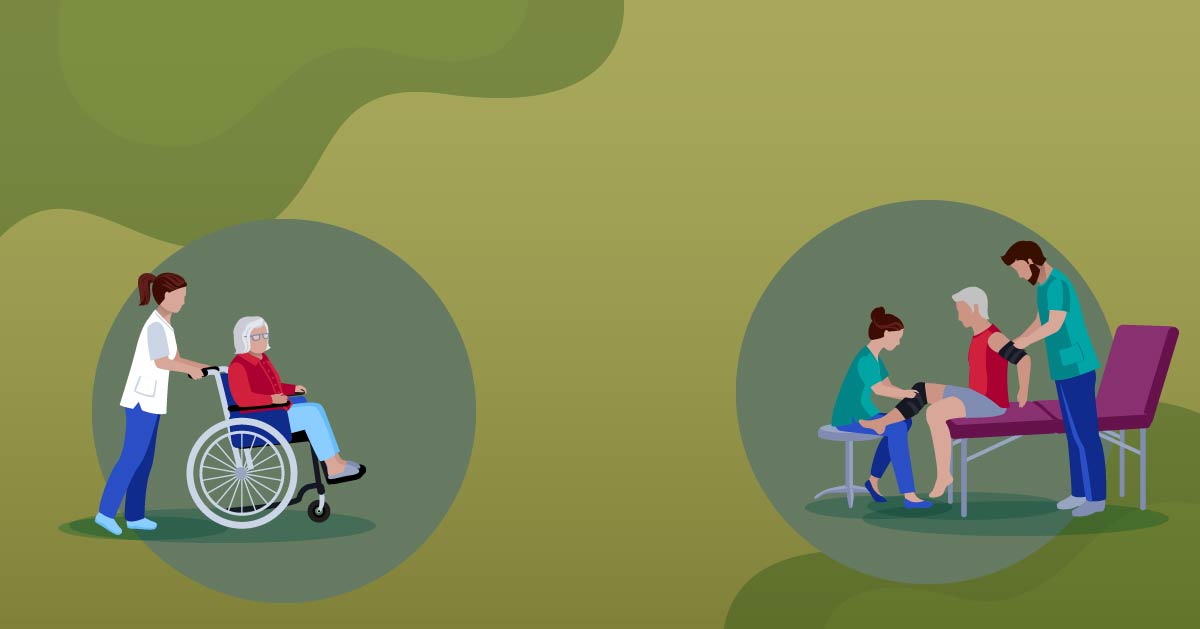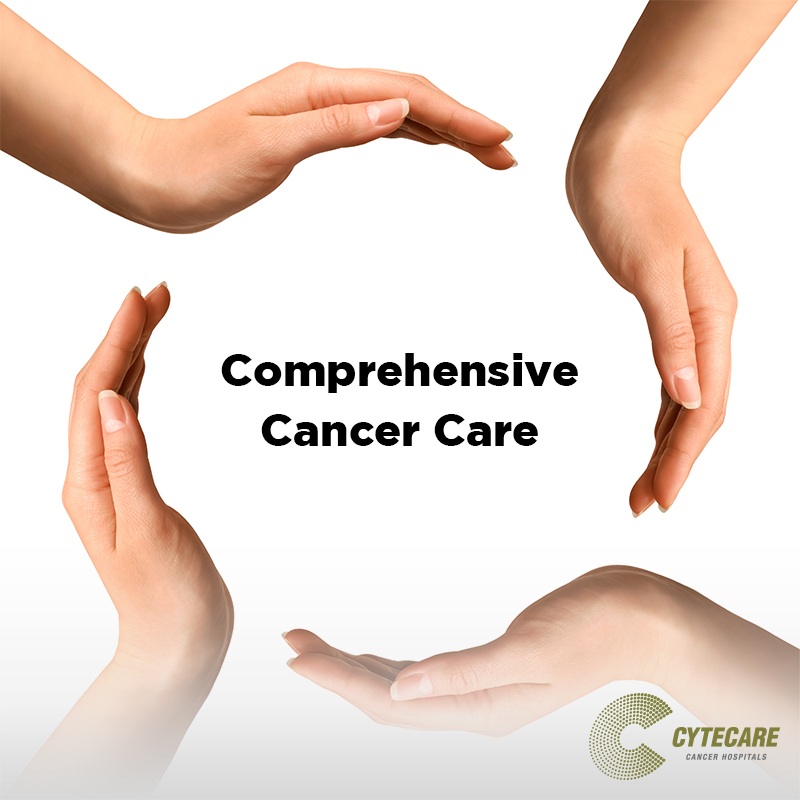
Palliative Care aims to improve the quality of life for both the patient and their family while the patient undergoes treatment for their illness.
Palliative care is very often confused with hospice care, which should not be the case. With hospice care, the aim is to provide comfort to the patient with a terminal illness, and after their treatment is over. In contrast, Palliative care aims to de-stress and provide relief from the symptoms of severe disease and can begin right from the diagnosis of the disease or at the beginning of their treatment.
Palliative Care Myths and Facts
Let’s debunk the following, widely associated myths of palliative care with their facts:
Myth 1: Palliative care means the end of life.
Fact: Palliative care is NOT provided at the end of life alone. It is care provided from the time of diagnosis of cancer alongside the curative treatment.
Palliative care ethos is about caring for the individual as an entire person from the beginning of diagnosis. Referral to the pain and palliative department does not mean the doctors have given up on the patient. It means supporting the patients with the best possible quality of life, enabling them to tolerate the curative treatment better. If the patient is not receiving any curative treatment for the illness, it does not mean all treatment is stopped. It means treatment, support and care continue, with a different goal of continuing to keep the best possible quality and dignity of life till the end.
Myth 2: Talking about palliative care means no hope in living.
Fact: Palliative care is NOT about taking away hope. It is about instilling and nurturing the right hope.
This is a distressing thought faced by patients and relatives, especially at the end of life. Palliative care is about encouraging the patient and relatives to focus on the beauty and blessing of each day. It focuses on helping the patient to live their days, independently and with dignity. It is about conversation and hope for another day to talk to each other. Make each day count. It is about acceptance and peace within one’s self, holding onto the right hope, to live each day as best can be lived.
Myth 3: Palliative care means depending completely on another person.
Fact: Palliative care is NOT about completely depending on another person. It is about maintaining Independence to the best ability possible.
Palliative care is about helping the patient maintain their independence, dignity and quality of life. It may mean the use of strategies in daily activities and supporting equipment such as oxygen, a walker (if and when needed) to enable the patient to live life to the fullest possible extent.
Myth 4: Cancer means pain and has to be borne.
Fact: Pain is a part of cancer, but SHOULD NOT be borne.
Relief from pain improves the quality of life of the patient and family and is their right.
Palliative Care is a team approach provided with care. At Cytecare hospitals, the team is called the ‘COMPREHENSIVE ONCOLOGY TEAM’. It involves a combination of care and support that looks at the holistic care of a person – encompassing their physical pain, psychological pain, social pain or emotional pain. Pain does not need to be borne. Through the right care, we help the patient live with dignity and the best possible quality of life till their last breath.
Myth 5: Palliative care is only about relieving pain and other physical symptoms of cancer.
Fact: The aim of palliative care is to help the patient with cancer HOLISTICALLY, NOT only relieve physical symptoms.
At Cytecare Cancer Hospitals, the Comprehensive Oncology team practices the ethos of palliative care, by caring for the patient in a holistic way. Pain is never purely physical pain. Physical pain is but the tip of the iceberg. The emotional, personal and psychological pain are bigger distressing aspects. These are addressed by the team alongside the physical symptoms, hence bringing about a reduction in total pain. THIS IS THE RIGHT OF EVERY PERSON.
Myth 6: Palliative care is only provided in a hospital.
Fact: NOT TRUE. Palliative care is provided by trained specialists at hospitals, hospice or at home.
At Cytecare hospitals, the discussion of Goals of care is encouraged. This gives the patient, family and doctor a clear understanding of what is expected and what can be provided. Place of care is part of that conversation. Home care is possible and will be supervised by the palliative physician. Hospice care is available in Bangalore at Karunashraya Hospice, where patients are cared for by palliative physicians.
Myth 7: Palliative care and its medicines shorten life span.
Fact: Palliative care is NOT about shortening the life span. Improving quality and dignity of life, in fact, improves the longevity of life.
Palliative care provides physical, emotional, and social support for the patient and their family to support them till the end of the patient’s life. It has been proven through studies that patients with advanced illnesses who receive palliative care have improved quality of life and live longer than people with the same advanced illness who did not receive palliative care.
Myth 8: Palliative care is only for people who have cancer.
Fact: Palliative care is NOT only for cancer. It is the care for any patient who has a life-limiting illness which is terminal or progressive in nature.
When we talk about a terminal progressive illness, we talk about conditions such as heart failure, chronic obstructive pulmonary disease, dementia, end-stage liver disease, motor neurone disease, Parkinson’s disease or stroke to name a few.
Myth 9: Palliative care is only for the patient who has cancer.
Fact: Palliative care is NOT ONLY for patients. The team cares for the family of the patient as well.
Caring for a patient with cancer is very difficult for the family. They are devastated by the change cancer has brought into their lives. The interdisciplinary (all members of the team working together) approach of palliative care is concerned with the well-being and quality of life of the caregiver.
Myth 10: Palliative care is not concerned with the family after the patient passes away.
Fact: Family is NOT forgotten after death or when the patient passes away. We continue to care for the family.
This is called Bereavement support. We know that the time after you lose your loved one is going to be very traumatic. Grief is difficult to express in words. The palliative team continues to support and talk to the family for as long as required.
Myths about morphine and other opioids in palliative care
Myth 1: If I am prescribed Morphine, it means I am in the final stages of cancer.
Fact: Morphine IS NOT given only in the final stages of cancer. It is prescribed at any stage of cancer if the pain is difficult to manage with other medications.
Pain is one of the common symptoms that is experienced by patients with cancer at any stage of their disease. Pain medications are always prescribed according to the World Health Organisation guidelines practised internationally. There are specific indications for the starting of morphine or other opioids. These indications can be at any stage of cancer.
Myth 2: Morphine leads to addiction.
Fact: Morphine DOES NOT cause addiction in cancer patients.
Morphine is prescribed by trained palliative physicians, only when a thorough evaluation of the patient has been made. The purpose of the morphine is to provide symptom relief that will help the patient live each day with as much comfort as possible. The patient is prescribed morphine for pain relief just as much as a diabetic /hypertensive is prescribed medications to control diabetes/ hypertension. There is constant monitoring and evaluation for dose adjustment as with diabetic/ hypertensive medications. Patients are educated regarding how to take morphine. One tablet of morphine will not be able to take away the pain for the whole day. This will be explained by the Palliative physician. Requiring morphine more than once a day is not addiction. Addiction only occurs when people have no pain, and they abuse morphine and related opioids by using it for pleasure and need to feel high. This is never the case with cancer patients. Their need for morphine is to be free of pain and to live each day without the fear of pain and distress. There are other opioids other than morphine, and the above information applies to all of them.
Myth 3: Using morphine will shorten life.
Fact: Morphine DOES NOT shorten life.
Morphine and other opioids are prescribed in the right doses individualized for each patient. There is constant monitoring of the patient and the dosage of medications. The goal of treatment is to relieve the pain, encouraging the patient to be independent as far as possible. This improves the quality of life, thus improving the quality of its length.
Myth 4: Morphine will take away the sharpness of my mind and make me drowsy.
Fact: Morphine helps relieve symptoms, hence allowing one to rest, nourish and recuperate well.
Morphine will help a person to a great extent, be free of the fear of pain and other symptoms, thus allowing them to rest well. Good sleep helps in rejuvenating the person physically, emotionally and psychologically, allowing them to interact, socialise and have independence and dignity.
Myth 5: Morphine will lose its effectiveness over time, and there will be no medicine to treat my pain later on if my pain is worse.
Fact: Morphine is titrated according to the individual need of the patient and WILL NOT lose its effectiveness.
Morphine is started at the minimum dose that is required to achieve adequate symptom control. The dose will need to be increased as the disease progresses and symptoms worsen. The dosage titration as it is called will not allow the morphine to lose its effectiveness. The palliative physician is trained to assess the requirement and will speak to the family regarding the prescribed medications and the way to administer them for maximum benefit for the patient. When chemotherapy or radiation therapy reduces or eliminates pain, the dose of morphine/ other opioids will be reduced and, in some instances, will be stopped. Hence, the dosage is titrated as per the requirement of the patient. Subsequent episodes of pain if any, will be evaluated and medicines prescribed as needed.
Myth 6: Taking Morphine will take away all kinds of pain caused by cancer.
Fact: Morphine WILL NOT take away all pains caused by cancer.
Physical pain experienced during cancer is of different types. Morphine alone will not be able to take away all types of pain. Your palliative physician will prescribe other medications which will need to be taken along with morphine. This will be explained to you.
Myth 7: Morphine will have side effects and won’t it affect my kidneys and liver?
Fact: Morphine WILL NOT AFFECT your kidneys or liver. Just as with all other medicines, morphine has side effects which are easily managed.
Morphine side effects are easily managed. Constipation is a major concern. How to manage this will be explained to all patients who are prescribed morphine. If there are any specific concerns, you should not hesitate to ask your palliative physician. Fear of the unknown and ‘google’ information should not prevent any patient, suffering from the painful effects of cancer, from accessing morphine. It is their RIGHT TO BE FREE FROM PAIN AND SUFFERING.

